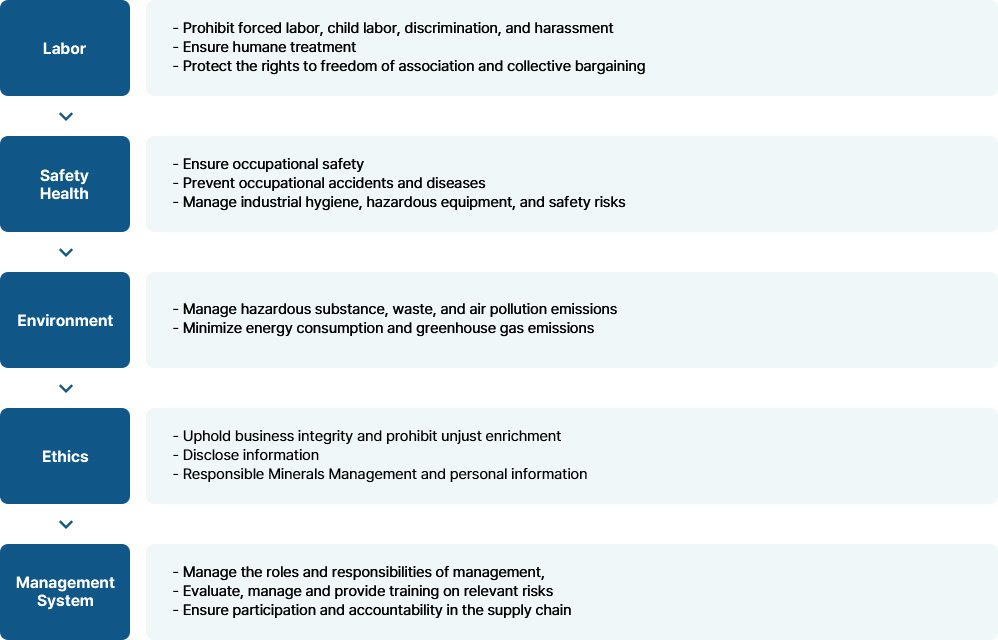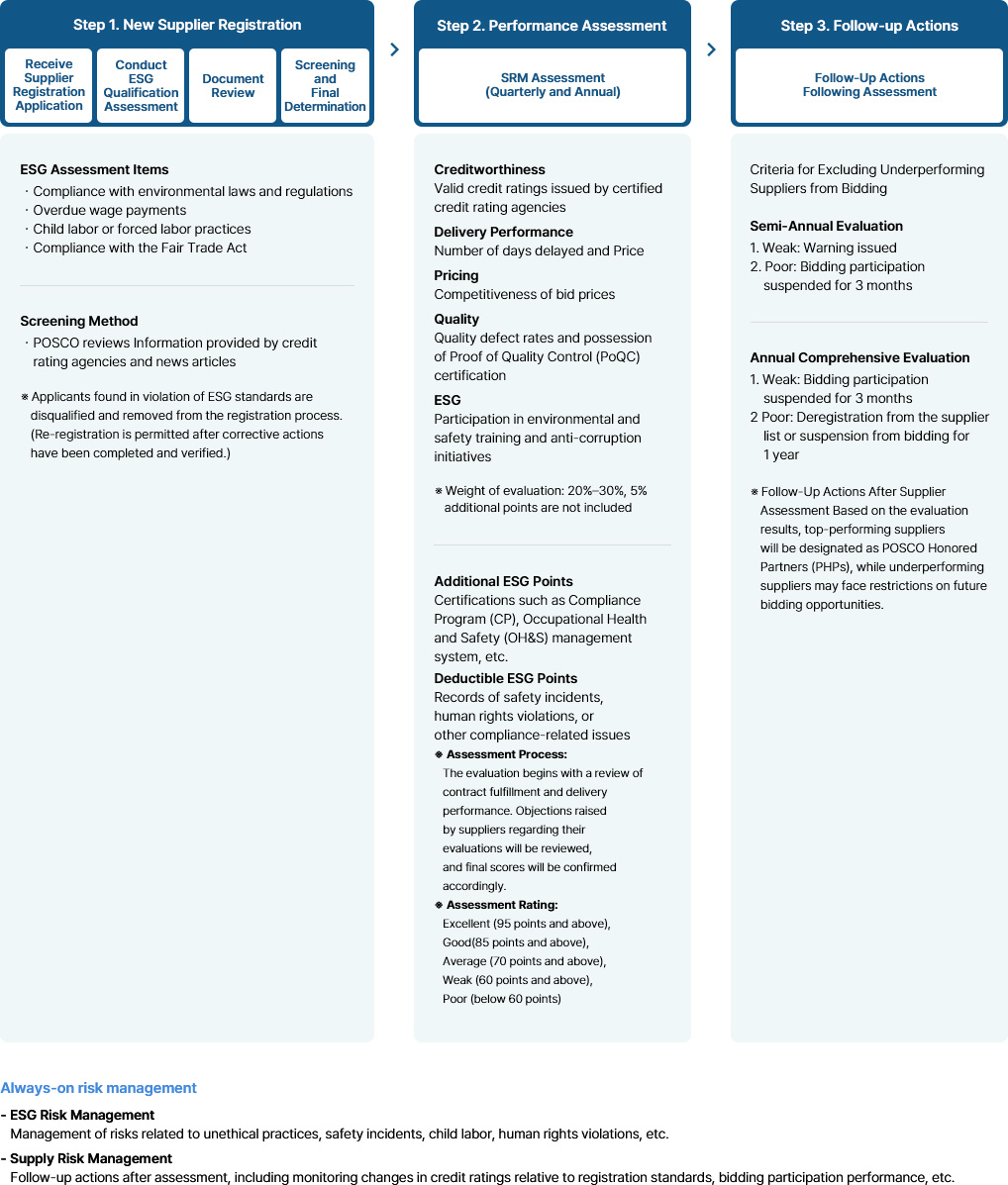SCM
Organization
Supply Chain Management Council
POSCO operates the Group Supply Chain Management Council to ensure a sustainable supply chain. The council is chaired by the Head of POSCO’s Procurement and Investment Division and brings together purchasing executives from POSCO and its group companies to discuss supply chain strategies, emerging issues, and risk management measures.
ㆍParticipating Companies: 11 companies, including POSCO, POSCO INTERNATIONAL, POSCO E&C, and POSCO FUTURE M
ㆍAttendees: Executives responsible for procurement at each company
ㆍMeeting Frequency: 1-2 times per year *2024 Meeting Date: October 15, 2024
ㆍMajor activities: Formulating a Group-wide ESG supply chain management strategy and coordinating joint response measures
Activities
- SCM Strategies: Develop group-wide strategies to enhance the sustainability of the supply chain by coordinating and aligning supply chain initiatives across all affiliated companies
- ESG Risks: Identify and assess potential ESG risks within the supply chain and implement measures to mitigate them
- ESG Supply Chain Trends: Disseminate the latest trends and best practices in SCM to enhance overall efficiency and effectiveness
- Sustainability Goals: Define strategic goals for building a sustainable supply chain aligned with global ESG standards, and establish detailed plans to achieve them
- Training and Capacity Building: Offer a range of training programs to strengthen ESG supply chain management capabilities
- Group-Wide Collaboration: Promote partnerships among POSCO Group companies to enhance the sustainability and competitiveness of the collective supply chain
- Monitoring & Reporting: Conduct regular monitoring of ESG performance in the supply chain and report on progress toward established targets.
Operational Status
Supplier Code of Conduct
POSCO has outlined the fundamental principles that all suppliers conducting business with the company must follow through the Supplier Code of Conduct. The Code comprises 42 provisions across five areas―labor, health and safety, environment, ethics, and management systems―based on the Responsible Business Alliance (RBA) Code of Conduct and POSCO’s internal regulations. We distribute detailed guidelines to promote understanding. In response to the growing need to enhance ESG practices across the external supply chain, we have been collecting suppliers’ signed commitments to the Code of Conduct through our e-procurement portal since 2024.
Key Provisions of the Supplier Code of Conduct
ESG Purchasing Policy
POSCO promotes sustainability throughout its supply chain by implementing a purchasing policy grounded in ESG principles.
Fair, Transparent, and Ethical Management Practices
POSCO accepts supplier registration applications at any time from companies seeking to do business with the company. In accordance with our fair trade policy, we ensure full transparency by disclosing all information related to Sourcing Groups (Purchasing Item Groups). The Internal Transaction Review Committee, established to prevent unfair internal transactions, reinforces POSCO’s commitment to ethical procurement.
Sustainable Purchasing
POSCO collaborates with global suppliers of raw coal and iron ore to develop raw material technologies to minimize environmental impact. We implement structured supply chain management practices to mitigate potential social risks associated with mineral extraction. In addition to our efforts to establish a responsible mineral sourcing system, manage ESG risks, and enhance communication with both internal and external stakeholders, we create social value through the Go Extra Mile (GEM) Fund―a one-on-one matching program with raw material suppliers―and give priority to companies with strong social responsibility practices.
Strengthening Supply Chain Capabilities
POSCO recognizes that the sustainable growth of small and medium-sized suppliers is critical to maintaining a stable procurement system. We promote technical collaboration with our suppliers, support their business operations through various programs, and help strengthen their capabilities through training and consulting initiatives.
Enhancing Purchasing Competitiveness
POSCO enhances its purchasing competitiveness by adopting a Total Cost of Ownership (TCO) approach that optimizes value across environmental, quality, and logistics considerations. We identify high-performing suppliers and offer incentives such as priority negotiation rights to strengthen supply chain resilience. We also apply item-specific sourcing strategies tailored to business impact and procurement complexity.
Risk Management
ESG Risk Management
POSCO operates a comprehensive ESG risk management system throughout the entire supplier lifecycle―from registration and performance evaluation to post-contract oversight―to prevent environmental, human rights, and other ESG-related risks within the supply chain.
Vendor management process
Step 1 New Supplier Registration
POSCO categorizes its purchases into Sourcing Groups, with registration criteria publicly available at all times on SteelN.com. We require all prospective suppliers to agree to the Supplier Code of Conduct and Special Ethics Terms.
For new applicants, we verify compliance with environmental laws and regulations, check for records of major incidents, and review any overdue wage or tax payments. We also evaluate basic qualifications such as credit rating, financial stability, and supply capacity. A site visit is conducted to assess actual operations, and quality tests are performed as needed to ensure product reliability.
Step 2 Performance Evaluation
POSCO conducts Supplier Relationship Management (SRM) evaluations on a quarterly or annual basis for all suppliers with an existing transaction history. We classify evaluation results into five grades―Excellent, Good, Average, Weak, and Poor―and apply tailored supply chain management strategies based on these results.
Since 2023, we have also conducted ESG due diligence across the supply chain to identify and mitigate risks related to environmental compliance, human rights, and other ESG concerns.
Step 3 Follow-up Actions
POSCO shares performance evaluation reports with suppliers on a quarterly or annual basis, offering feedback on strengths and areas for improvement. We provide various benefits to suppliers rated as Excellent, including priority negotiation rights and exemptions from deposit requirements. Suppliers rated as Poor are encouraged to make voluntary improvements; however, if progress remains insufficient, bidding restrictions may be imposed for a period of three months to one year.
Supply Chain Risk Assessment
POSCO continuously monitors registered suppliers to strengthen supply chain resilience and mitigate potential risks. We may suspend transactions with suppliers found to have ESG-related issues, such as violations of environmental or safety standards. We also deregister suppliers whose credit ratings fall below the minimum threshold for Sourcing Group registration (below grade B), or those with no bid participation in the past year or no business transactions with POSCO for two consecutive years.
ESG Due Diligence
In 2023, POSCO established “The Supply Chain ESG Due Diligence Process” by incorporating the ESG rating agencies and conducted the initial round of due diligence. In 2024, we revised and distributed the Supplier Code of Conduct to reflect updated external requirements, including those related to customers and assessment cycles.
In March 2024, we selected 356 suppliers―with annual transaction volumes exceeding KRW 500 million and a transaction history spanning the past three consecutive years―for ESG due diligence, and completed assessments for 331 of them. In collaboration with a third-party rating agency, we conducted on-site due diligence for companies flagged as high-risk during document-based reviews or those that underperformed in the previous year’s on-site assessments. For suppliers receiving improvement recommendations, we provide tailored support through one-on-one solutions delivered by specialized consulting firms.
Supply Chain Due Diligence Process
Responsible Minerals
POSCO has established a robust policy and operational framework for responsible mineral1) sourcing, aligned with the OECD Due Diligence Guidance for Responsible Supply Chains of Minerals. We are committed to strengthening our capabilities in responsible purchasing and supply chain oversight. All newly registered suppliers are required to sign a consent form agreeing to POSCO’s Responsible Minerals Policy. If any minerals are identified as originating from Conflict-Affected and High-Risk Areas (CAHRAs2)),* we engage exclusively with smelters certified under the Responsible Minerals Assurance Process (RMAP), a globally recognized third-party validation program. To enhance traceability, we collect detailed supply chain data using our own supplier and smelter survey templates, along with the Conflict Minerals Reporting Template (CMRT) and Extended Minerals Reporting Template (EMRT) provided by the Responsible Minerals Initiative (RMI). Suppliers identified as high-risk through internal assessments are subject to enhanced monitoring and management in accordance with POSCO’s established risk response protocols. Since 2021, POSCO has published its Responsible Minerals Report annually, ensuring transparency in disclosing all related management activities.
1)Minerals mined in a way that does not cause issues such as human rights violations, environmental destruction, and inflow of funds to conflict organizations and fulfills social responsibilities
2)CAHRAs (Conflict-Affected and High-Risk Areas) refer to regions where issues such as conflict, child labor, and human rights abuses are prevalent―for example, the Democratic Republic of the Congo.
Responsible Minerals Use
Since 2020, POSCO has expanded its responsible minerals management beyond tin and tungsten―two of the four key conflict minerals (tin, tungsten, tantalum, and gold, collectively referred to as 3TGs)―to include cobalt, due to its association with serious human rights issues such as child labor in mining operations. As of 2024, we source minerals from conflict-affected and high-risk areas exclusively through smelters certified under the Responsible Minerals Assurance Process (RMAP).
| Minerals | RMI Smelter ID | Name of Smelter | Country of Origin | RMAP Certification |
|---|---|---|---|---|
| Tin | CID001477 | PT Timah Tbk Kundur | Indonesia | Certified |
| Tin | CID001482 | PT Timah Tbk Mentok | Indonesia | Certified |
| Tin | CID001463 | PT Sariwiguna Binasentosa | Indonesia | Certified |
Tungsten | CID002315 | Ganzhou Jiangwu Ferrotungsten Co., Ltd. | China | Certified |
Responsible Minerals Management Process
Conflict-Affected and High-Risk Areas (CAHRAs)
Grievances and Appeals
We operate a dedicated grievance and appeals channel via our Responsible Minerals email account to ensure stakeholders can share their concerns with POSCO(Sending grievances or objections via e-mail without a separate form responsibleminerals@posco.com )
We are also responding to various inquiries and grievances related to supplier registration and performance evaluation with an open attitude. It operates a dedicated staff to communicate with suppliers’ difficulties in real time and electronic purchasing system.
Through the “Open Purchase Counseling Room” within the “e-Procurement”, we listen to the supplier’s opinions and give feedback I have it. (Purchase Division 054-220-5000, Cooperation Division 054-220-7000)
Metrics and Goals
Performance Management
Supplier Due Diligence
Supplier Due Diligence Performance
| Suppliers Selected | Suppliers Audited | Completion Rate |
|---|---|---|
| 356 companies | 331 companies | 93% |
Supplier Due Diligence Goals
* Includes a cumulative total of 100 companies audited from 2023 to 2024
Supplier Performance Appraisal Results
| Indicators | Unit | 2022 | 2023 | 2024 |
|
|---|---|---|---|---|---|
| Total Number of Suppliers Evaluated | Count | 1,729 | 1,700 | 1,663 |
|
| Total Number of Suppliers Evaluated | Number of Suppliers Rated as Excellent | 237 | 261 | 309 |
|
| Number of Suppliers Rated as Poor | 3 | 1 | 1 |
||
% of Poor-Rated Suppliers with a Corrective Action Plan in Place | % | 100 | 100 | 100 | |
% of Suppliers Showing Improvement from Previous Year’s Evaluation | 77 | 86 | 83 | ||







